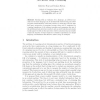Free Online Productivity Tools
i2Speak
i2Symbol
i2OCR
iTex2Img
iWeb2Print
iWeb2Shot
i2Type
iPdf2Split
iPdf2Merge
i2Bopomofo
i2Arabic
i2Style
i2Image
i2PDF
iLatex2Rtf
Sci2ools
IFL
2005
Springer
2005
Springer
Accurate Step Counting
Abstract Starting with an evaluator for a language, an abstract machine for the same language can be mechanically derived using successive program transformations. This has relevance to studying both the time and space properties of programs because these can be estimated by transitions of the abstract machine and measuring the size of the additional data structures needed, such as environments and stacks. In this paper we will use this process to derive a function that accurately counts the number of steps required to evaluate expressions in a simple language, and illustrate this function with a range of examples.
Related Content
| Added | 27 Jun 2010 |
| Updated | 27 Jun 2010 |
| Type | Conference |
| Year | 2005 |
| Where | IFL |
| Authors | Catherine Hope, Graham Hutton |
Comments (0)

